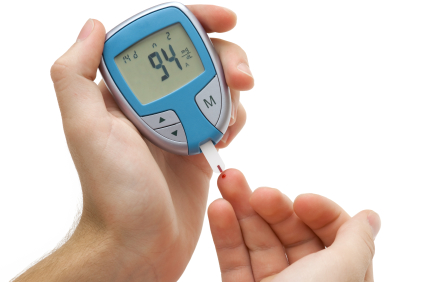I’ve been talking about inflammation and the thyroid over the past few blogs, and this week I’d like to talk about a study related to another inflammatory/ autoimmune condition- diabetes. It seems there is significant evidence that links the development of diabetes to poor thyroid function.
You already know that thyroid hormone regulates metabolism, and a few months ago, I wrote about how it also controls insulin and can impact blood sugar level. These thyroid actions are the reasons why several research studies in the past have suggested that being hypothyroid can increase the risk of becoming diabetic. Another interesting connection is that both hypothyroidism and diabetes can be triggered by an autoimmune reaction.
Type 1 diabetes (the one people are born with) is known to be associated with high rates of hypothyroidism because of this autoimmune connection. What is less clear is the relationship between hypothyroidism and Type 2 diabetes, the type that develops as a result of poor dietary and lifestyle choices.
A small study evaluated the rate of hypothyroidism in Type 2 diabetic women as compared to controls (women without diabetes). A whopping 45% of the diabetic patients were found to be hypothyroid as compared to the non-diabetic women (only 11%). 75% of the diabetic patients also had elevated thyroid antibodies (indicating autoimmunity) as compared to only 7% of non-diabetic patients. This finding further cements the theory that an autoimmune mechanism can affect both thyroid and blood sugar regulation.
Based on this and other studies, it seems to be important to correct thyroid function as well as possible to help manage diabetes and blood sugar over the long term.
So what about the earlier stages of thyroid disease (when tests are borderline, but not out of normal range (so not considered hypothyroid)? An interesting pattern was revealed in a large study which I wrote about a few months ago. It tracked people’s thyroid levels and blood sugar tests over the course of seven years. This study showed a clear pattern when testing 2 different thyroid parameters. Both stayed within “normal range”, but as TSH increased (signaling declining thyroid levels), the risk of developing diabetes increased as well. Likewise, as thyroid hormone (T4) levels decreased, the risk of developing diabetes increased. The correlation was clear that as thyroid levels declined to borderline-low, pre-diabetes progressed closer to Type 2 diabetes.
This study is also important because it serves as a warning to anyone in “prediabetes” stage to pay attention to their thyroid levels. It shows the importance of being aware that you are at greater risk to develop full blown diabetes if thyroid hormone is low. The findings of this study suggest it would be wise for physicians to screen for thyroid problems in anyone with abnormal blood sugar levels to prevent diabetes.
More research on this connection between diabetes and hypothyroidism is definitely indicated. I would be interested to see if we learn that it’s beneficial to start supporting the thyroid with hormones, herbs and nutrition in earlier stages, when thyroid tests are borderline, not abnormal. And maybe research would find a connection between low body temperatures (as in Wilson’s Temperature Syndrome) and diabetes. It’s possible that addressing thyroid health earlier could contribute to lowering the rate of diabetes overall.
References:
Ther Clin Risk Manag. 2016; 12: 1757–1762.
Chaker et al. BMC Medicine (2016) 14:150 (1-8)


Leave A Comment